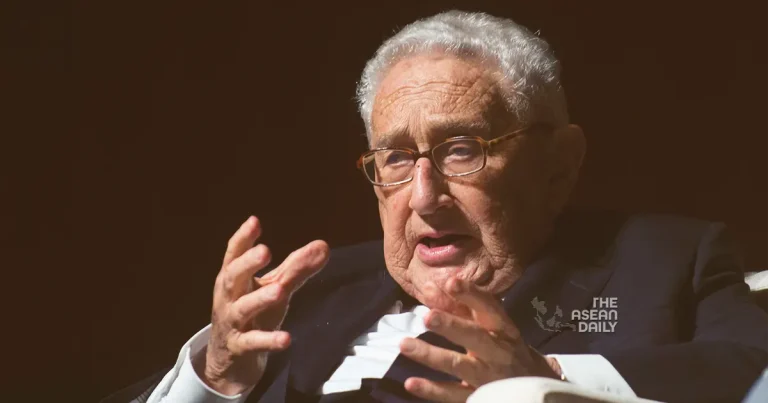2-12-2023 (SINGAPORE) Renowned American statesman Henry Kissinger passed away on November 29 at the age of 100, leaving behind a legacy that is as nuanced as the man himself. Celebrated for his role in shaping U.S. foreign policy during the 1970s, particularly the normalization of ties with China and the stabilization of Arab-Israeli relations, Kissinger was also a figure of controversy, criticized for policies linked to human rights violations.
Understanding the Enigma: Kissinger’s Worldview
To comprehend the polarized views surrounding Dr. Kissinger, one must delve into his worldview. A stalwart practitioner of realpolitik pragmatism, he believed morality had limited relevance in the realm of global politics, where power was the predominant currency. For Kissinger, peace was the ultimate goal, requiring tough decisions that left little room for sentimentality.
During his tenure as national security adviser and later as secretary of state under Presidents Richard Nixon and Gerald R. Ford, Kissinger navigated the complexities of Cold War geopolitics, particularly focusing on preventing a nuclear conflict while safeguarding American interests. This perspective sheds light on some of the controversial policies of that era, such as tolerating right-wing dictatorships in Latin America, involvement in violence in Bangladesh, and the bombing of Cambodia.
Kissinger’s Impact on Southeast Asia
With this understanding of Kissinger’s worldview, his contributions to Southeast Asia during a tumultuous period become evident. Amidst the threat of communist movements supported by the Soviet Union and China, Kissinger played a crucial role in shaping American policy. The Vietnam War, where communist insurgencies were most urgent, witnessed escalating U.S. involvement and the expansion of the war into Cambodia.
Despite these actions, the escalating costs of the war and mounting casualties compelled Kissinger to engage in secret negotiations with North Vietnam, ultimately leading to the 1973 Nobel Peace Prize, shared with North Vietnamese counterpart Le Duc Tho. However, Kissinger never collected his prize due to the unpopularity of the war.
Rapprochement with China: A Diplomatic Milestone
While the Vietnam War posed immediate challenges in Asia, Kissinger’s pivotal role in the rapprochement with China emerged as a defining achievement. His secret trip to Beijing in 1971 paved the way for President Nixon’s historic visit in 1972, establishing a “tacit alliance” with long-lasting consequences for Southeast Asia.
The normalization of U.S.-China ties created conditions for Chinese leader Deng Xiaoping to consolidate power, move away from Maoist radicalism, and embark on a path of reform and economic liberalization. China mourns Kissinger’s passing not only as that of an “old friend” but also as a symbol of a more optimistic era in Sino-American relations.
Connection with Lee Kuan Yew: Intellectual Soulmates
In exploring Kissinger’s connections with Southeast Asia, his relationship with Singapore’s founding prime minister, Lee Kuan Yew, is noteworthy. Both men shared a profound respect for each other, with intellectual alignments on global affairs. Kissinger’s eulogy for Lee Kuan Yew emphasized their close friendship, describing him as a “great man” whose leadership the world would miss.
Legacy and Ongoing Debate
As the world reflects on Henry Kissinger’s passing, his hard-nosed, amoral, and pragmatic approach to international affairs remains a subject of ongoing debate. A figure of both brilliance and mistakes, Kissinger’s impact on Southeast Asia during its formative post-colonial years is undeniable, with reverberations still felt today. His legacy, though complex, will undoubtedly endure in the annals of diplomatic history.




